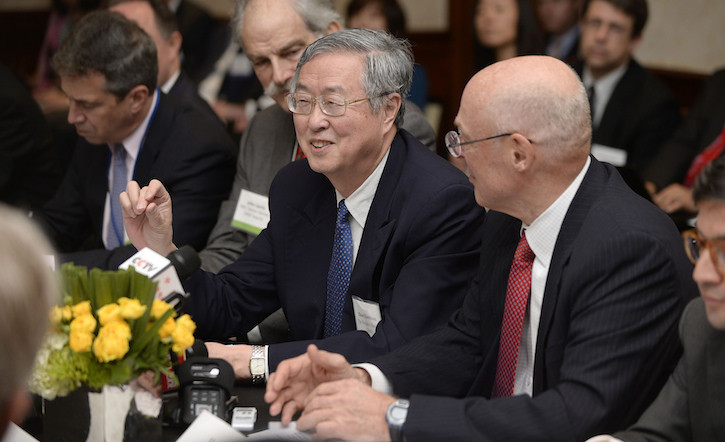
The Paulson Institute and the Green Finance Committee under the People’s Bank of China convened a half-day symposium of global finance leaders and experts to discuss recommendations for the development of robust global green finance mechanisms and markets. The recommendations coming out of the meetings will be provided to the G20 Green Finance Study Group, which is chaired by the People’s Bank of China and the Bank of England. The study group will finalize a synthesized report for the G20. SIFMA, Bloomberg Philanthropies and United Nations Environment Programme also co-hosted the event.
Green Finance Symposium Findings & Recommendations
With China designating green finance as a priority issue during its presidency of this year’s G20 meeting, today’s symposium developed recommendations for the creation of more efficient financing mechanisms to support the green transformation of the global economy. Recommendations included the need to mainstream environmental risk management in the investment decision-making process by banks and institutional investors, to develop the green bond market, to improve disclosure of environmental information by listed companies and bond issuers, and to provide mechanisms to “de-risk” the adoption of green technologies. These efforts will greatly facilitate the mobilization of private capital for green investment that will address environmental and climate challenges.
“The world is facing serious environmental challenges. We need to make stronger commitments to addressing them. We have tried many ways, including environmental regulations, pricing reforms, and fiscal policies. These have all worked in some way in controlling pollution and slowing the pace of global warming, but they are not enough. The financial system should also play an important role in promoting the green transformation of our economies.” said People’s Bank of China Governor Zhou Xiaochuan. “In China, establishing a green finance system has become a national strategy. In the first quarter of this year, China’s issuance of green bonds amounted to about 50% of the world’s green bond issuance.”
“There is an opportunity for the G20 to create practical green financing models for the developed and the developing world. The good news is there is an abundance of capital globally, but governments need to create the proper conditions to attract this capital. They have an important role to play in setting the policies, regulations, and incentives, and in ensuring that they are enforced,” said Paulson Institute Chairman Henry M. Paulson, Jr. “Global capital markets are powerful forces. Directed properly, they can alleviate the burden on governments and unlock a sustainable economic future.”
“The capital markets provide a tremendous opportunity for advancing global climate goals. As nations move forward with their commitment to green growth, funding sources will have to be as innovative as the green initiatives they seek to finance. Public funding will never be sufficient, which is why more nations are turning to global capital markets to fund green initiatives, whether it is through the use of green bonds, equity financing through green IPOs, or other methods,” said Kenneth E. Bentsen, Jr., president and CEO of SIFMA.
The seminar opened with welcome remarks by Mr. Bentsen, followed by statements from Governor Zhou and Mr. Paulson. Paulson then moderated a discussion with top CEOs, government ministers, and sustainability and green finance experts on the challenges and opportunities facing the international financial community in driving green finance. The following panel explored concrete steps needed for greening the financial system. Subsequent panels outlined the development of green funds and bonds and issues related to regulations and disclosure. The event closed with remarks delivered by Paulson Institute Senior Fellow Deborah Lehr.
The Paulson Institute is working with the Chinese government to help launch a Green Building Energy Efficiency Fund, which would pioneer new green finance mechanisms to facilitate the development of environmentally sustainable buildings. Buildings present a particular environmental opportunity, as some 30 percent of global carbon emissions come from the energy used in buildings. “With the right regulations and finance mechanisms in place, emissions could drop significantly,” Paulson said.


